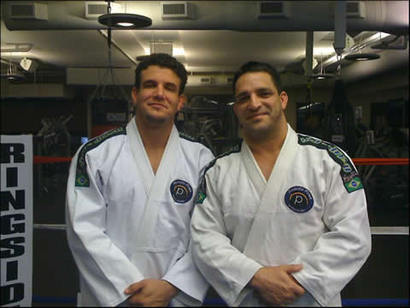Ricardo is a 4th degree black belt under Sergio Penha (Osvaldo Alves). He founded the Las Vegas Combat Club and coached Frank Mir to his first UFC heavyweight title. This piece is on the takedown, which can be such a sticky wicket for ground fighters if they don't have a wrestling or judo background.
by Deborah Markel
 Q: How do you stop an elephant from charging?
Q: How do you stop an elephant from charging?
A: Take away its credit card.
Substitute for the elephant a guy who is wider than he is tall, with cauliflowers for ears and the name of a high school wrestling team on his rash guard—then what happens?
Then you might have a problem. Or—as Ricardo Pires prefers to see it—an opportunity.
Pires acknowledges that takedowns are challenging.
“They are not my biggest strength,” he says, “although I believe in some of my takedowns. But it all comes back to knowing your weakness and blocking it.”
How do you block your weakness if your weakness is the takedown?
“Look,” says Ricardo Pires, “Every time I see myself on the mat trying to get something at all costs, it doesn't work. When you start losing control of yourself, you lose control of the situation. You lose control of the situation and you're done. You have to be flexible. You know, like. Let me go around a little bit.”
How do you go around a takedown? It seems pretty unavoidable.
“Going around means, when the guy is attacking, I let him come.”
What happens then?
“When he makes a mistake, I counterattack. It's about knowing my limitations. If I start out by saying I'm going to take this guy down, chances are he's going to take me down instead.”
Wait a minute—determination is a good thing. Isn’t it?
“It depends on the situation,” says Pires. “When you see judo in the Olympics, both guys are trying to take each other down, and each guy knows exactly what the other guy is going to do—and he does it anyway! The problem is, what if the guy has a bad shoulder or something and he can't go forward with his plan? So once again, I think it depends on the situation. There is a time to be flexible and a time to be determined.”
According to Pires, takedowns are a big stumbling block—literally—for Brazilians.
“Back in the 90's when the UFC started,” he says, “Brazilians didn't know takedowns. It got us—I mean them—really confused. They spent way more time trying to learn the takedowns and beat the wrestlers rather than, Hey, you know what, you're going to take me down anyway so just take me down so we can get to the ground faster which is where I want to be anyway. So they stopped polishing the ground game and started focusing more on the takedowns.”
“The takedown is very important,” Pires goes on, “but what happened is Brazilians got better in takedown defense and worse with the ground game. They went with the fashion. Like today it's cool to ground and pound. You see a lot of really good Jiu-Jitsu guys trying to ground and pound. But I mean, where's your Jiu-Jitsu? Look at Demian Maia. He was submitting everybody and when he fought Nate Marquardt, he got beat because he came on as a kickboxer.”
Are you saying he relied on his weakness rather than his strength?
“The Brazilian way is go around the obstacle,” says Pires. “But with takedowns, the takedown is the obstacle, and all of a sudden, [Brazilians] think they are going to knock it down. But when they go against somebody who's a really good wrestler, chances are they're not going to get the takedown.”
“Out of a hundred guys,” Pires goes on, “you'll maybe find four who are really good at takedowns. I can name them. Ricardo Arona is one—he's really good and he's incredibly strong—and a few other guys.”
So if you're not Ricardo Arona, or one of the names on Pires' short list, what are you supposed to do to prepare for a moment that's as inevitable—and as scary—as death and taxes?
“Takedowns are hard to train,” he says. “Hitting the ground is tough. It's like breaking the ice. When you meet somebody for the first time, you have to go there and introduce yourself. In BJJ you have to go to the ground.”
If your main focus is getting to the ground, what does it matter who gets the takedown? How important is the takedown in deciding the fight?
“I think it's big,” says Pires. “It's big because nowadays everybody is so prepared. Physically prepared and mentally prepared, and if you get the takedown you start with two points ahead. For our guys, from Osvaldo's [Osvaldo Alves de Albuquerque, Red Belt], pretty much all of us are really good on top. For us it is crucial to be on top. Osvaldo's guys are not that great playing guard, spider guard, or ass guard (laughs) whatever, I hope he doesn't get mad at me for saying that! But our guys are really good on top and okay on our backs.”
So if you want to be on top the takedown is pretty important?
“Very important.”
If you lose the takedown, how hard is it to get back on top?
“You just hope,” says Pires, “at least, I'm always thinking, Oh man, I hope the guy pulls guard. It makes my job so much easier. I don't care about the two points, if I'm on top I'm okay. I don't mind losing the opportunity of scoring two points because I'm so confident on top.”
“Maybe I'm overconfident,” says Pire with a laugh, “but if the guy pulls guard, I want to kiss him!”
So what matters most to you is the position, not the points.
“Yes, exactly.”
“Of course,” Pires goes on, “some people are really good on their backs, so they don't have to go for the takedown. The point is, try to find an easier route to achieve what you need. If we start on our feet and I pull guard I just lost two points. People don't want to train to get better to get those points, because it's hard. So they pull guard, because it's easy, hoping that the other guy doesn't pull guard too. You end up with both people fighting on their butts.”
Always the gentleman, Pires self-edits. “I mean, their backs.”
You started out in judo, as did Osvaldo Alves. How important is cross-training in competitive BJJ today?
“I like cross training if it's the right kind.”
What's the right kind?
“I went to Vegas last year,” says Pires, “and I saw people jumping around from one school to another. One guy said to me, I'm going to train with you in the morning, train kickboxing in the afternoon, and boxing in the night, and tomorrow I'm training Jiu-Jitsu again in the morning and wrestling in the afternoon. He was actually training in four or five different schools. To me that's not cross training. They think it is.”
You think it's too much?
“To me,” says Pires, “this is like going to a library, taking out 30 books, and reading five or six pages of five or six chapters of each book but you don't finish any of them. You don't learn anything, you just get confused. But hey, my guys can train anywhere they want. I don't close the door.”
In other words, jack of all trades, master of none?
“What it comes down to,” says Pires, “is you have to do what you do best. Let me give the example of my son Victor. Victor wants to go for the takedown. Does he know some takedowns? Yes. But in his case his bottom game is pretty good and I think once you have white, blue, and purple belt in America, and even getting into the brown belt level, you can find guys who are really good on their feet. You can have a really good blue belt on his feet because he's done a lot of wrestling. So Victor's chances of finding somebody as good as him on their feet or better is pretty good, and what I say is why give the guy the chance?”
You think trying for the takedown can be a bad thing?
“Let's say,” says Pires, “you try for the takedown, and you miss it. The guy's going to be on your side for maybe 30 seconds to a minute. So you lose a minute plus two points. So why not pull guard and start attacking? That's what Victor and I talked about before the Abu Dhabi trials, and it worked. Victor pulled guard, swept, and got the guy in side control and he was winning for the first minute or so.”
So in other words, find what you do best and stick with it?
“I'm not saying don't train takedowns,” says Pires. “I'm not saying don't train boxing. I'm saying do what you do best. If you find you're a better wrestler than you are a Jiu-Jitsu guy, then fine—go that route. But the odds are, you're not.”
So what would you say is the most important thing to remember when going for a takedown?
“Know your weakness,” says Pires. “That's the first thing and the main thing. On the mat, in business, in your life—it's all the same. If you don't know your opponent, you have to know your own weakness—and block it.”
“Look,” Pires concludes, “I'm not saying we don't have to try for the takedown, but maybe we have to go around it. Maybe the key is not to go for the takedown but to try and focus more on the counter to the takedown.”
“What I’m saying is,” says Pires, “try to go around the obstacle.”





